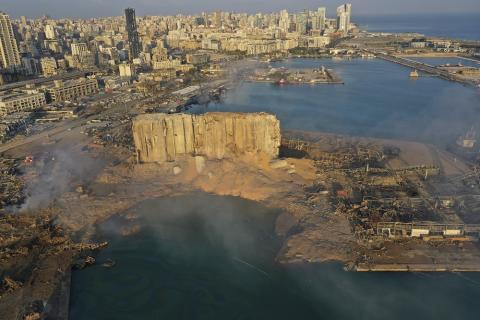
At first glance, it seems a strange or contrived comparison, as there is no link, neither in terms of context nor content, between the Cairo Agreement signed in 1969 and the blast that went off a year and a few days ago.
Sponsored by Gamal Abdel Nasser in all his glory, the Cairo Agreement was signed by the Lebanese authorities and the Palestinian Liberation Organization and garnered respectability, for these reasons, that the port blast could never attain. Despicable and vile, alongside glaring crime are rightfully the only terms that describe what happened on August 4, 2020. Here no officials, not of any sort, signed an explicit agreement allowing the Ammonium Nitrate to be stored at the Port of Beirut. No regional state stood behind such an agreement.
With that, the first thing that the two events have in common is that in both cases, the Lebanese state relinquished part of its sovereignty in favor of an armed civil faction stronger than it is. In 1969, the Lebanese state assured the PLO that it would relinquish a segment of the country, both its territory and its residents.
Today, the state openly affirms that large parts of the country and much of its political decisions are outside its purview.
The second thing they have in common is their result: the Cairo Agreement created a situation that led to war, first in 1973, then on a larger scale in 1975, and then with the Israeli invasions of 1978 and 1982. Today, the state’s desertion led to the crime at the port, the first anniversary of which coincided with the first Israeli airstrikes since 2006. The Israelis accompanied their latest attacks with a message that the Lebanese state is responsible for what happens on its territory. They spoke of targeting an area with Hezbollah tunnels, rocket launching sites, and command centers. This infrastructure and the Ammonium Nitrate are next of kin.
This assessment does not acquit the state. On the contrary, it strengthens the accusation. It is a state that has forgone and forgoing promotes corruption and negligence in general, even when these qualities do not apply to the foregoing party, to say nothing about the outcome when they do.
The wisdom guiding the state’s contemporary and historical relinquishment is the following: The matter does not concern us. It concerns only them. In 1969, the state was no longer concerned with a segment of its territory and residents. Now, it is the command centers, field sites, and crossings that Hezbollah sees as “strategic” that do not concern it, whether they are used to move Syria and defend its regime against “the takfiri enemy supported by foreign enemies” or “fighting the Zionist enemy.” These are arguments that no president, minister, civil servant, or military personnel can stand against, nor would they think of resisting them. Sharing sovereignty, here, is the root of corruption and negligence.
Another dose of cynicism reinforces this policy, in 1969, cynicism took this form: Let us leave a piece of land for the Palestinians and Israelis to fight on. Their casualties, as well as those from south Lebanon, are far from us here in Beirut and Mount Lebanon.
The writer Omar Kaddour described the contemporary form of cynicism as adeptly as can be in a Facebook post saying:‘‘The unintentional murder of Lebanese who were killed by the explosion, and the intentional murder of the Syrians who were killed by the quantities that had gone to Bashar al-Assad. Did he know? Yes, he knew, and he thought that the matter wouldn’t go beyond the murder of Syrians.’’
The authorities’ cynicism isn’t everything, and this makes the problem far more complicated. The Cairo Agreement of yesterday and the privilege of possessing an arsenal granted to Hezbollah today are two demands that enjoy a degree of popularity that cannot be underestimated. Here, we find the explanation for why we see people stutter as they treat corruption and negligence as consequences of the relinquishment policy. The many indications that the Ammonium Nitrate is tied to the war of Bashar al-Assad, and Hezbollah with him, against the Syrian people, say only this. The magnitude of the genocidal strike is far greater than that of ordinary corruption and negligence that resembles other forms of corruption and negligence.
The inability to say this and act accordingly renders every step forward a potential step backward. It renders Judge Tarek Bitar’s attempts more courageous but less likely to succeed. It leaves drowning in triviality with a broad horizon. It turns going beyond March 8 and 14, a prospect that October 17 enthralled us by raising into a regression back to the era of the “Lebanese National Movement” and a “Lebanese Front,” as indicated by the recent clashes between the Lebanese Forces and the Communists. It is, as the popular expression goes, “trying to alter the flavor without adding to the dish.” However, it is not easy to reach out to the dish, which many see as sacrosanct. Every hand that extends to do so is cut off.
This is certainly not an attempt to acquit corruption and negligence; rather, it is meant to reframe them within the broader context of the regional conflict and Lebanon’s involvement in it, thus its “obligations of war.” This delineation, besides making the problem more difficult, hinders the revelation of truths, whether it comes to the crime of February 14, 2005, or in the port crime. The ruse is precisely that truth equals civil war. That is what happened after the Cairo Agreement. God forbid.











